- Home
- Simon Beckett
The Chemistry of Death dh-1 Page 7
The Chemistry of Death dh-1 Read online
Page 7
'She might have been holed up writing. Or just have gone off somewhere. Been called away without having time to tell anyone.'
'And been killed as soon as she got back, without anyone in the village seeing her?'
'It's possible,' I said stubbornly. 'She could have surprised a burglar.'
'She could,' Mackenzie conceded. 'In which case we need to know one way or the other.'
'I don't see where I come into it.'
'What about the dog?'
'The dog?' I repeated, but I could already see what he was getting at.
'It makes sense to assume that whoever killed Sally Palmer killed her dog as well. So the question is, how long has the dog been dead?'
I was torn between being impressed at Mackenzie's sharpness, and irritation that I hadn't seen it myself. Of course, I'd been trying hard not to think about it at all. But there was a time when I wouldn't have needed it pointing out.
'If the dog's been dead roughly the same length of time,' Mackenzie went on, 'then that gives more credence to your burglar. She's either here all the time writing or arrives back from wherever, her dog disturbs an intruder, he kills them both and then dumps her body on the marsh. Or whatever. But if the dog's been dead longer that puts a different complexion on it. Because that means whoever murdered her didn't do it straight away. He kept her prisoner for a few days before getting bored and carving her up with a knife.'
Mackenzie paused to let the impact of his words hit home. 'Now, I'd say that was something we'd need to know, wouldn't you, Dr Hunter?'
Sally Palmer's house had been transformed since the last time I'd seen it. Then it had been silent and empty; now it was host to grim-faced and uninvited visitors. The courtyard had filled with police vehicles, while uniformed and white-boiler-suited forensics officers went about their business. But the activity only seemed to underline the atmosphere of abandonment, transforming what had once been a home into a pathetic time capsule of the recent past, to be picked apart and pored over.
There seemed nothing left of Sally's presence as I walked across the courtyard with Mackenzie.
'The vet came for the goats,' he told me. 'Half of them were already dead, and he had to destroy a couple of others, but he says it's amazing any survived at all. Another day or two would have finished them. Goats are tough buggers, but he reckoned they must have been a couple of weeks without being fed or watered to get to that state.'
The area at the back of the house where I'd found the dog had been taped off, but other than that it was as I'd found it. No-one was in as much of a hurry to move a dog, and either the forensics team had already finished or felt there were other priorities to examine first. Mackenzie stood back and popped a mint into his mouth as I crouched down beside the body. It looked noticeably smaller than I remembered – not necessarily a trick of memory as by this time the decay would be waging an almost visible war of attrition on what was left.
The fur was misleading, disguising the fact that the dog had largely been reduced to bone. Tendons and cartilage remained, like the open tube revealed by the wound in its throat. But there was hardly any soft tissue left. I used a stick to lightly poke in the earth around it, took in the empty eye sockets, and then stood up.
'Well?' Mackenzie asked.
'It's difficult to say. You've got to take into account the smaller body mass. And its fur will have some effect on the rate of decay. I'm not sure what, exactly. The only comparative work I've done on animals was with pigs, and they have a hide, not a pelt. But I'd guess it'd make it harder for insects to lay their eggs, except in open wounds. So that'll probably slow things down.'
I was talking to myself more than him, rapidly brushing through cobwebs of memory, sifting through the knowledge that had been lying dormant.
'What soft tissue was exposed has had animals picking at it. See this here, around the eye sockets? The bone's been gnawed. Too small for foxes, so it's probably rodents and birds. That probably happened quite early on, because once it gets too ripe they'll leave it alone. But that means less soft tissue, and so less insect activity. And the ground here is much drier than the marsh where you found the woman.' I couldn't quite bring myself to say Sally Palmer. 'That's why it looks dried up. In this heat, without moisture it'll mummify. It changes the way the body decays.'
'So you don't know how long it's been dead?' Mackenzie prompted.
'I don't know anything. I'm just pointing out that there are a lot of variables here. I can tell you what I think, but bear in mind it's only a preliminary estimate. You're not going to get any hard and fast answers just from a quick look.'
'But…?'
'Well, there still aren't any empty pupae husks, but some of these look about ready to hatch. They're darker than those we found around the body, obviously older.' I pointed at the open wound in the dog's throat. On the ground around it, a few shiny black carapaces could be seen crawling in the grass. 'There are a few beetles here as well. Not many, but they tend to come later. Flies and maggots are the first wave, if you like. But as the decay progresses the balance changes. Less maggots, more beetles.'
Mackenzie was frowning. 'Were there beetles where Sally Palmer was found?'
'Not that I saw. But beetles aren't as reliable an indicator as maggots. And, like I say, there are all the other variables to take into account.'
'Look, I'm not asking you to swear under oath. I just want some idea of how long the damn thing's been dead.'
'Rough guess.' I looked at the scrap of fur and bone. 'Twelve to fourteen days.'
He chewed his lip, scowling. 'So it was killed before the woman.'
'That's how it looks to me. Comparing this with what I saw yesterday, the decomposition is perhaps three, four days more advanced. Take off the extra day and night this has been lying outside and you're still looking at around three days. But like I say, it's only guesswork at this stage.'
He eyed me, thoughtfully. 'Do you think you're wrong?'
I hesitated. But he wanted advice, not false modesty. 'No.'
He sighed. 'Shit.'
His mobile rang. He unclipped it from his belt and moved away to answer it. I stayed by the dog's body, scrutinizing it for anything that might cause me to revise my opinion. Nothing did. I bent down to take a closer look at its throat. Cartilage lasted longer than soft tissue, but animals had been here too, chewing the edges. Even so, it was still evident that it was a cut, not a bite. I took a pencil light from my pocket, reminding myself to disinfect it before I examined anyone's tonsils again, and shone it inside. The cut extended all the way to the cervical vertebrae. I played the light on a pale line gouged across the bone. No animal had caused that. The blade had gone so deep it had cut into the spine as well.
That made it a big knife. And a sharp one.
'Seen something?'
I'd been too engrossed to hear Mackenzie return. I told him what I'd found. 'If the bone's marked clearly enough you might be able to tell if the blade was serrated or not. In any event, it would have taken strength to cut that deeply. You're looking for a powerful man.'
Mackenzie nodded, but he seemed distracted. 'Look, I've got to go. Take as long as you like here. I'll tell forensics not to disturb you.'
'No need. I'm done.'
'You won't change your mind?'
'I've told you as much as I can.'
'You could tell us more if you wanted to.'
I was beginning to feel angry at the way he was trying to manipulate me. 'We've already been through this. I've done what you asked.'
Mackenzie seemed to be weighing something up. He squinted into the sun. 'The situation's changed,' he said, reaching a decision. 'Someone else has gone missing. You might know her. Lyn Metcalf.'
The name hit me hard. I remembered seeing her outside the chemist's the evening before. Thinking how happy she'd looked.
'Went running this morning and didn't come back,' Mackenzie went on, relentlessly. 'Could be a false alarm, but right now it doesn't look like it. And if
it isn't, if this is the same man, then the shit's really going to hit the fan. Because either Lyn Metcalf's already dead, or she's being held somewhere. And given what was done to Sally Palmer, I wouldn't wish that on anybody.'
I almost asked why he was telling me all this, but even as the question formed I knew the answer. On the one hand he was putting more pressure on me to co-operate; on the other, Mackenzie was simply being a policeman. The fact that I'd reported Sally Palmer as missing had put me low on the list of potential suspects, but if there was now a second victim then everything was up in the air again. No-one could be discounted.
Including me.
Mackenzie had been watching to see how I would react. His expression was unreadable. 'I'll be in touch. And I'm sure I needn't ask you to keep this to yourself, Dr Hunter. I know you're good at keeping secrets.'
With that he turned and walked away, his shadow chasing him across the grass like a black dog at his heels.
If Mackenzie had been serious about my keeping Lyn Metcalf's disappearance to myself he needn't have bothered. Manham was too small a place for something like that to remain secret for long. Word had already spread by the time I'd got back from the farm. It came at roughly the same time as news broke that the murdered woman was Sally Palmer, a double blow that was almost too much to take in. Within hours the mood of the entire village had changed from febrile excitement to one of shock. Most people clung to the hope that the two events would prove unconnected, and that the supposed second 'victim' might yet turn up safe and sound.
But it was a hope that faded every hour.
When Lyn didn't return from her run, her husband Marcus had set out to look for her. He admitted later he wasn't unduly worried to start with. At that point, before Sally Palmer's name had been released, his main concern was that his wife might have decided to try a different route and become lost. It had happened before, and as he followed the track towards the lake, it was with a degree of irritation that he called her name. Lyn knew he had a busy day, and now her stupid insistence on an early-morning run was making him late.
He still wasn't too anxious as he crossed the reedbeds and cut into the woods. When he found a dead mallard tied to the standing stone, his first reaction was anger at the senseless cruelty. He'd lived all his life in the country and had no time for sentiment where animals were concerned, but neither did he like casual sadism. Only as he thought of it in those terms did the first chill of fear begin to enter his mind. He told himself that the dead bird couldn't possibly have any connection with Lyn being late. But once there, the fear was impossible to dislodge.
It continued to grow, fed by his echoing shouts that rang unanswered in the trees. By the time he began making his way out of the woods he was fighting to remain calm. Hurrying back towards the lake, he told himself she would probably be waiting for him back at home. And then he saw something that blew away his false hopes like so much dust.
Half-hidden by a tree root was Lyn's stopwatch.
He picked it up, took in the broken strap and cracked face. Fear now giving way to panic, he looked around for some other sign of her. There was nothing. Or, at least, nothing he recognized as such. He saw the thick wooden stake hammered into the ground nearby without realizing its significance. It would be several hours before the police forensic team confirmed it as the remains of a snare, and several more before splashes of Lyn's blood were identified on the path.
But of Lyn herself, there was no trace.
8
It seemed like most of the village turned out to help with the search. At another time, or in different circumstances, it might have been thought that Lyn Metcalf could have left of her own accord. Oh, she and Marcus seemed happy enough, it was generally agreed. But you could never tell. Coming when it did, though, on the heels of the murder of another woman, her disappearance immediately took on a far more sinister aspect. And while the police concentrated their efforts on the woods and area where she'd gone running, virtually everyone who was fit and able wanted to help find her.
It was a beautiful summer evening. As the sun lowered in the sky and swallows dipped and swooped, the atmosphere could almost have been festive, a rare sense of communal unity and resolve. But no-one could forget for long the reason for them being there. And with that came another unpalatable fact.
Whoever had done this was one of Manham's own.
It was no longer possible to blame an outsider. Not any more. It could hardly be an accident, and certainly no coincidence, that the two women came from the same village. No-one could believe that an outsider would have either stayed around after killing Sally Palmer, or come back to claim a second victim. Which meant that whoever had hacked one woman to death and strung wire across a path to snare another had to be local. There was a chance it was someone from a neighbouring village, but that begged the question of why Manham had been the site for both attacks. The other possibility was both more likely and more frightening: that not only did we know the two women, we also knew the animal responsible.
That realization was still taking root as people set out to look for Lyn Metcalf. And although it hadn't yet begun to flower, it was already beginning to put up shoots. It revealed itself as a slight distance in the way people responded to each other. Everyone knew of murders where the killer had taken part in the search. Where they had publicly expressed revulsion and sympathy, even shed reptilian tears, when all the while the victim's blood was barely dry on their hands, the final screams and entreaties locked away to fester in their heart. And even as Manham showed its solidarity as a community, kicking aside long grass and peering under bushes, suspicion was already undermining it from within.
I'd joined the search myself as soon as I finished evening surgery. Its epicentre was the police trailer set up as near to the woods where Marcus Metcalf had found his wife's stopwatch as the road allowed. It was on the outskirts of the village, and cars were pulled into the hedgerows for quarter of a mile either side of it. Some people had just struck off by themselves, but the majority had come here, drawn by the glut of activity. There were a few journalists, but only from the local press. At that point the nationals still hadn't picked up on the story, or perhaps felt that one woman murdered and another abducted wasn't particularly newsworthy. That would soon change, but for the moment Manham was still able to go about its business with relative anonymity.
The police had set up a table to help co-ordinate the public search. It was as much a PR exercise as anything; giving the community a sense that it was doing something and making sure the volunteers didn't get in the way of the professional teams. But the countryside around Manham was so wild that it would be impossible to cover all of it anyway. It could soak up searchers like a sponge without ever giving up its secrets.
I saw Marcus Metcalf standing with a group of men, yet slightly apart from them. He had the undefined muscle bulk of a manual worker, and a face that, under normal circumstances, was pleasant and cheerful under a shock of blond hair. Now he looked haggard, a pallor yellowing his tanned features. With him was Scarsdale, the reverend finally finding a situation that suited the severity of his features. I'd considered going over to express… what? Sympathy? Condolences? But the hollowness of anything I could say, and memory of how little I'd appreciated the awkward utterances of near strangers myself, prevented me. Instead, leaving him to the reverend's ministrations, I went straight to the table to be told where to go.
It was a decision I would come to regret.
I spent an unproductive few hours trudging across a boggy field as part of a group that included Rupert Sutton, who seemed glad of the excuse to be out without his domineering mother. His bulk made it hard work for him to keep up with the rest of us, but he persevered, breathing heavily through his mouth as we slowly made our way across the uneven landscape, trying to skirt the wetter patches of ground. Once he slipped and stumbled to his knees. His perspiring body gave off an animal whiff of exertion as I helped him up.
'Bugger,' he pant
ed, his face colouring with embarrassment as he stared at the mud coating his hands like black gloves. His voice was surprisingly light, almost girlish. 'Bugger,' he kept repeating, blinking furiously.
Other than that, few people spoke. When the growing dusk made it impractical to search any longer we abandoned the attempt and made our way back. The general mood was as sombre as the darkening landscape. I knew many of the searchers would stop off at the Black Lamb, seeking company more than alcohol. I almost went straight home. But I didn't feel like being alone any more than anyone else did that night. I parked outside the pub and went in.
Apart from the church, the Lamb was the oldest building in the village, and one of the few in Manham that had a traditional thatched roof. Anywhere else in the Broads it would have been smartened into twee respectability, but with only the locals to please no real attempt had been made to halt its slow decay. The reeds on its thatch were slowly mouldering, while the unpainted plaster of its walls was cracked and stained.
Tonight, though, it was doing good business, but it was far from a party atmosphere. The nods I received were solemn, the conversation low and subdued. The landlord lifted his chin in silent enquiry as I reached the bar. He was blind in one eye, the milky cast emphasizing the resemblance to an ageing Labrador.
Tint, please, Jack.'
'You been out on the search?' he asked as he set the glass in front of me. When I nodded he waved away my money. 'On the house.'
I barely had time to take a drink before a hand fell on my shoulder. 'Thought you might come in tonight.'
I looked up at the giant who'd materialized beside me. 'Hi, Ben.'
Ben Anders topped six feet four, and seemed half as broad again. A warden at Hickling Broad nature reserve, he'd lived in the village all his life. We rarely saw much of each other, but I liked him. He was easy company, someone I felt as comfortable maintaining a silence with as talking to. He had a pleasant, almost dreamy smile in a heavy-boned face that looked as though it had been screwed up and only partially smoothed out again. Set in its tanned leather, his eyes seemed incongruously bright and green.

 Where There's Smoke
Where There's Smoke The Chemistry of Death
The Chemistry of Death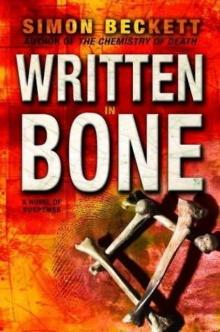 Written in Bone
Written in Bone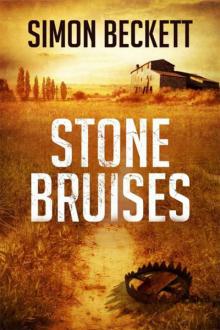 Stone Bruises
Stone Bruises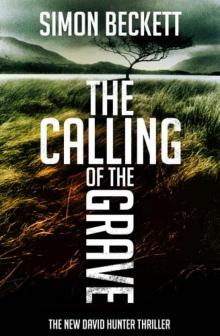 The Calling of the Grave
The Calling of the Grave Whispers of the Dead
Whispers of the Dead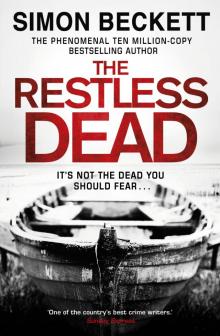 The Restless Dead
The Restless Dead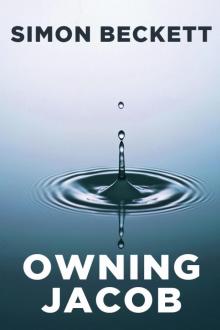 Owning Jacob
Owning Jacob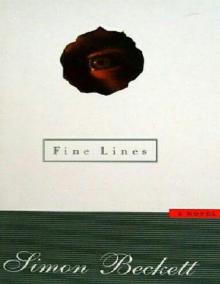 Fine Lines
Fine Lines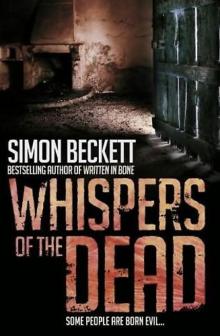 Whispers of the Dead dh-3
Whispers of the Dead dh-3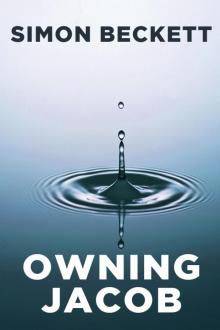 Owning Jacob (1998)
Owning Jacob (1998)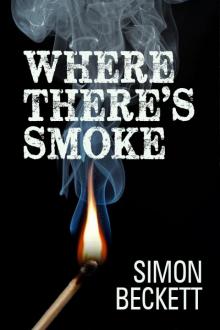 Where There's Smoke (1997)
Where There's Smoke (1997)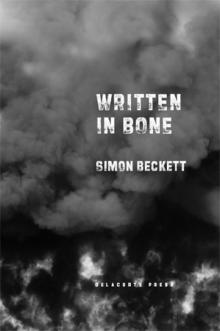 Written in Bone dh-2
Written in Bone dh-2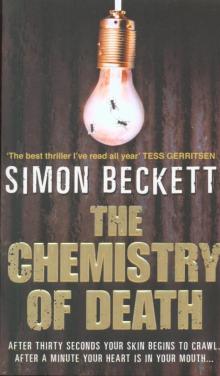 The Chemistry of Death dh-1
The Chemistry of Death dh-1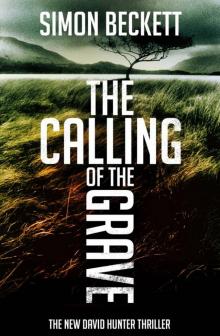 The Calling Of The Grave dh-4
The Calling Of The Grave dh-4